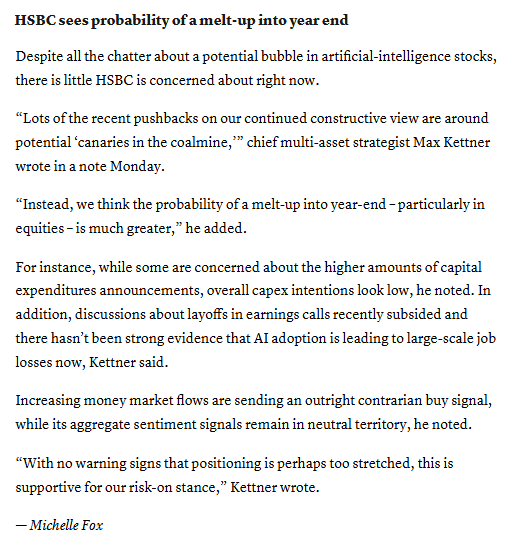年底是暴涨还是暴跌?汇丰 Max Kettner 的观点解读
🤡这篇文章可能有小伙伴又认为我是在无脑多了,先说明这是一篇我看到的文章,然后加以解释,并不代表我的个人观点,虽然我觉得他说的挺对的,而且思路和我很像。(有点不要脸了)
先介绍一下,这篇文章的作者是汇丰首席多资产策略师 Max Kettner ,他在过去几年中预测对了大部分市场的涨跌。(并不是100%准确)
🤡🤡然后就是他的结论,Max 认为到今年年底,市场面临的最大风险不是崩盘(Melt-down),而是“融涨”(Melt-up)。
崩盘大家都知道是什么意思,我大概介绍一下什么是融涨,融涨指的是资产价格在短时间内剧烈、快速地上涨。但这通常不是由经济基本面改善驱动的,而是由投资者的“错失恐惧”(FOMO)、空头回补(Short Squeeze)以及大量场外资金突然涌入所驱动的。
🤡🤡🤡接下来就是我对于他文章的解读,正文开始。
这篇文章的主要叙事就围绕着“由于大家手里现金太多且过于谨慎,市场反而会因为没得跌了而暴涨”。
这个观点来进行的,目前市场上有很多看跌的声音,但是这些看跌并不是源自于实际利空的信息,而且 Max 并不认为基本面很糟,并不认为 AI 并会导致大规模失业,以及企业的资本支出意愿看起来很低。
他对于资金的理解是,投资者都在害怕,所以把钱从股市撤出来,并且持有美元现金(DXY上涨的原因)或者货币基金(美债收益率下降的原因)。反而这是一个“逆向买入的信号”。因为一旦股市反弹,这些巨量的场外现金就会因为害怕踏空而被迫追高买入(FOMO),从而推动股市暴涨。
并且认为市场并没有处于“全民炒股”的狂热阶段,仓位并不算非常的满。这说明还有很多人(或机构)没买够,还有加仓的空间。(解释了为什么机构在建仓)
其中的观点包括了:
1. 企业的投资意愿并不高,这说明没有过度投资的泡沫。
2. 财报会议里关于裁员的讨论变少了。
3. 目前没有强有力的证据表明 AI 正在导致大规模失业。
以上三点说明了美国经济还是处于安全的区域,既然没有大规模裁员,就没有衰退的出现,抛售只是源于恐慌,而不是真的有进一步的利空,比如衰退。
目前美国货币市场基金里的现金规模处于历史高位(大约6-7万亿美元)。这说明大家都很害怕,把钱从股市(加密货币市场)撤出来存利息了。但 Max 认为既然大家手里全是现金,说明潜在的买盘是巨大的。一旦股市稍微反弹,这些为了避险的钱就会因为害怕踏空而重新涌入股市,从而把股价推到天上去。
这里我的想法是,如果12月美联储选择了降息,那么可能这部分现金就会进入到市场中。当然除了12月降息可能还有川普的一些做法也会带动市场的情绪,甚至是法院判处川普的关税违法,并且取消,也会是利好风险市场。
🤡🤡🤡🤡总的来说,Max 认为最近几天的暴跌是洗盘。因为投资者的恐慌(VIX 飙升,买货币基金),反而把市场洗干净了,为年底的融涨腾出了空间。Max 并不看重宏观数据,他看重的是资金流向。他认为货币市场基金中的 7 万亿美元不会只想吃利息。
我的观点和他相似的就是市场不是没有反转的机会,一个是停摆以后造成的流动性缺失现在还没有恢复,一旦恢复会为市场注入活力,其次是半个月后的美联储议息会议未必就没有降息的可能,然后就是川普的关税很有可能会被取消,这三点都有可能是让市场反弹的诱因。
而结合 Max 的文章来看,他认为一旦反弹就会让市场出现 FOMO ,从而大幅提升价格。当然他说的是股市,而我始终认为 $BTC 和 科技股是高度关联的,目前股市的主导也是科技股,所以科技股上涨,Bitcoin 应该不会太差。
🤡🤡🤡🤡🤡结束,Max未必是对的,我也未必是对的。不同意见的小伙伴就当是了解一些无用的知识吧。
Bitget VIP,费率更低,福利更狠

免责声明:本文章仅代表作者个人观点,不代表本平台的立场和观点。本文章仅供信息分享,不构成对任何人的任何投资建议。用户与作者之间的任何争议,与本平台无关。如网页中刊载的文章或图片涉及侵权,请提供相关的权利证明和身份证明发送邮件到support@aicoin.com,本平台相关工作人员将会进行核查。




